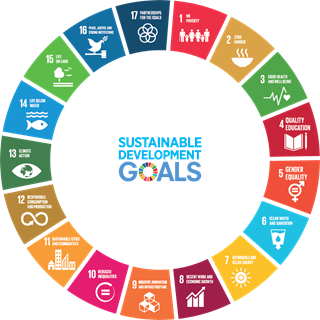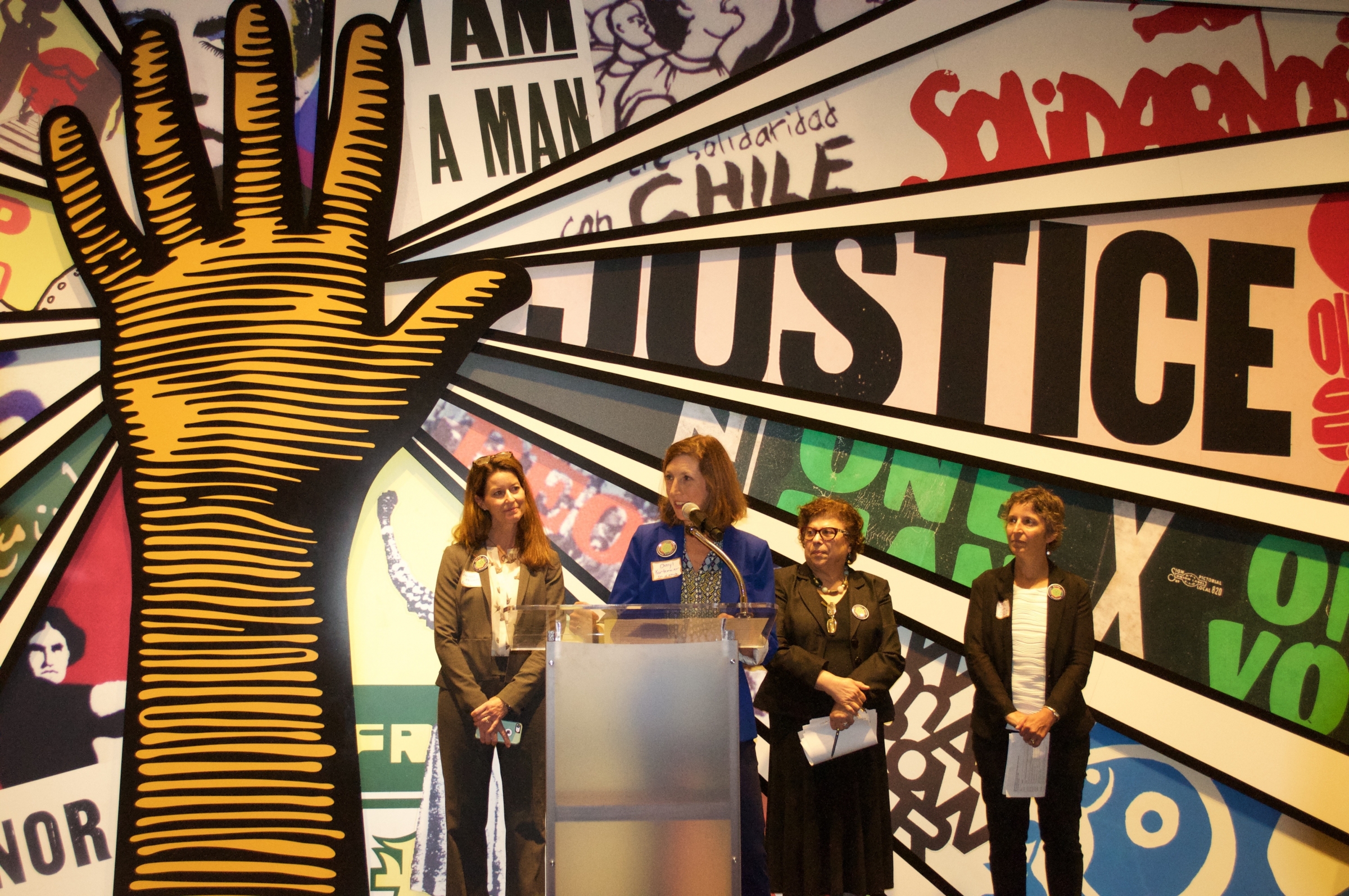SLS is excited to share that we have expanded our work with Georgia Tech faculty to integrate community sustainability and the U.N. Sustainable Development Goals (SDGs) into courses and course modules. We are leading a collaborative initiative to expand SDG teaching tools and training opportunities throughout the RCE Greater Atlanta area—and beyond!

Going Global: A Sustainable Development Goals (SDG) Curriculum Design Workshop
Georgia Tech’s Strategic Plan 2020-2030 states that the Institute “is redefining what it means to be a leading public technological research university in this new era, committed to empowering people of all backgrounds and to integrating our resources across disciplines to create a better future for our community — locally, nationally, and globally.” To advance this bold vision, the Plan specifically references the U.N. Sustainable Development Goals (SDGs) as a framework for advancing multidisciplinary research and teaching that equip students to become change agents, applying their Georgia Tech education to advance sustainable development.
 The UN SDGs are a set of 17 broad and interconnected goals that address the global challenges humanity faces. They are comprehensive and visionary, including ending poverty and hunger, reducing inequality, and strengthening the health of human communities and ecosystems globally. Incorporating the SDGs into our teaching can help students make connections between their disciplinary knowledge and skills and the world’s most pressing challenges. These “real world” connections also often make course content more relevant to students, enhancing motivation.
The UN SDGs are a set of 17 broad and interconnected goals that address the global challenges humanity faces. They are comprehensive and visionary, including ending poverty and hunger, reducing inequality, and strengthening the health of human communities and ecosystems globally. Incorporating the SDGs into our teaching can help students make connections between their disciplinary knowledge and skills and the world’s most pressing challenges. These “real world” connections also often make course content more relevant to students, enhancing motivation.
How can we expand and enhance SDG integration in college teaching—at Georgia Tech and beyond? Last month, SLS and several partners presented “Going Global: A Sustainable Development Goals (SDG) Curriculum Design Workshop.” The workshop involved close to 50 faculty members from 14 colleges and universities across the U.S., Europe, and South America, all interested in teaching with the SDGs. A number of the participants learned about the workshop through the University Global Coalition, a group of higher education leaders from across the globe who work together to advance the SDGs through education, research, service, and campus operations. Through advance preparation and a 90-minute virtual workshop, we provided resources and mentored participants through a modified course design process to begin integrating the United Nations Sustainable Development Goals (SDGs) into their teaching units, courses, and even across departments for some participants.
This workshop extended the introduction to teaching with the SDGs provided one year ago in the “Think Globally, Teach Locally” event at Georgia Tech. Using a hands-on approach, “Going Global” set out the following goals:
- Build faculty relationships across colleges and universities around shared interest in teaching with the SDGs.
- Engage additional faculty members in the RCE Greater Atlanta’s “Teaching with the SDGs” initiative.
- Enhance teaching effectiveness by supporting SDG course integration skills.
- Expand and share online resources that support the use of SDGs in college teaching.
- Identify opportunities to further support faculty in curricular integration of the SDGs.
A cross-institutional team of RCE Greater Atlanta collaborators planned and facilitated the workshop: Rebecca Watts Hull (Serve-Learn-Sustain) and Evan Mallen (CTL) at Georgia Tech, Şebnem Özkan (Atlanta Global Studies Center), Michael Black (Georgia State University) and Ryan Keesee (Kennesaw State University).
Michael Black opened the workshop with an introduction to the RCE Greater Atlanta, followed by a video presentation from recent Georgia Tech graduate and “17 Zooms” participant Madison Novak. Novak explained why students are calling for SDG integration throughout the college curriculum. Next, video presentations from Richard Milligan at Georgia State, Na’Taki Osborne Jelks at Spelman College, and Shatakshee Dhongde at Georgia Tech illustrated three different approaches to SDG curricular integration. Dr. Dhongde’s examples included economics units and a new cross-disciplinary certificate program, while Dr. Osborne Jelks and Dr. Milligan’s talks described course-level SDG integration that helped students connect local initiatives to global challenges through engagement with community partners.
Following these examples and a brief course design orientation, participants moved into breakout sessions based upon their interests: integrating the SDGs at the unit level, course level, or programmatic levels. We adapted CTL workshop materials that guide participants through key elements of “Backward Design,” and introduced a new template for integrating SDG “Big Ideas” and learning objectives with those in existing courses or units. The breakout group work was possible with support from these additional RCE Greater Atlanta members, who served as facilitators: Mine Hashas-Degertekin (Kennesaw State – KSU), Jenny Hirsch (SLS), Mandy McGrew (KSU), Ruthie Yow (SLS), and Pegah Zamani (KSU). These 45-min work sessions helped faculty make progress toward their SDG course integration goals and learn from peers working on similar projects.
How Can I Learn More?
SLS and the RCE Greater Atlanta have made available many resources to help you teach with the SDGs. SLS’s Teaching Toolkit has links to a wide range of resources on the SDGs and Education for Sustainable Development (ESD) in the category U.N. Sustainable Development Goals (SDGs). Resources include readings, videos, lesson plans, blog posts written by the SLS U.N. SDGs 2019 Faculty Fellows, and online materials that offer “big ideas,” learning objectives, and sample activities for each SDG.
SLS will continue to expand these SDG teaching resources and is working through the RCE Greater Atlanta to plan further faculty professional development opportunities. For example, this summer SLS will work with CTL to offer an “SDG integration” option during CTL’s summer course design workshop. We also are considering options for a future Faculty Learning Community or Community of Practice focused on incorporating the SDGs into course design and teaching.
Eager to get involved? Contact Rebecca!

About the RCE Greater Atlanta’s Higher Education Learning Community (HELC)
RCE Greater Atlanta was acknowledged by the United Nations University in 2017 as a Regional Centre of Expertise on Education for Sustainable Development. RCEs support collaborative implementation of the U.N. Sustainable Development Goals at the regional level. One of over 174 worldwide, RCE Greater Atlanta brings together universities and colleges from across the region with nonprofit, community, government, and business partners.
RCE Greater Atlanta has four Action Groups that guide its work, including the Higher Education Learning Community (HELC). Each Action Group has several projects that provide focus for its work. The Going Global workshop was presented by HELC’s “Expanding SDG Teaching Resources for Higher Education” project. Like to get involved? Contact Rebecca!
Rebecca Watts Hull is a Service Learning and Partnerships Specialist with SLS and Adjunct Academic Professional in the School of History and Sociology. She leads the “Expanding SDG Teaching Resources for Higher Education” project of the RCE Greater Atlanta’s Higher Education Learning Community (HELC) Action Group. She also serves on the RCE’s Leadership Circle.